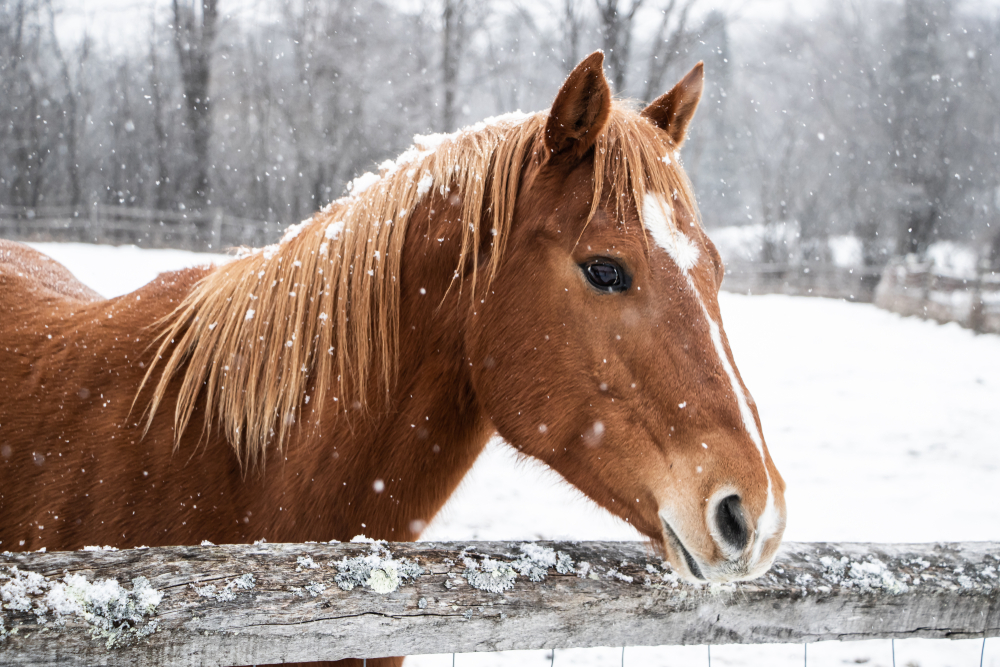
If your horse or pony is struggling to gain weight over winter or even having a hard time losing it, as is commonplace with well looked-after good doers, Waterman's Country Supplies has put together some vital tips and tricks that you need to consider.
Traditionally, horses gain weight in the summer in anticipation of the harsh winter months ahead. However, the over-efficiency of hardworking horse owners has meant that healthy horses can struggle to lose weight in winter. Whereas winter weight loss is a much more predictable outcome of the cold weather, horses that have a hard time cutting down can face a whole host of health problems, unless calories are managed. Alternatively, poor doers can lose too much weight in winter making them vulnerable to the bitter conditions, unless the right measures are put in place.
Whether you're worried about weight gain or weight loss this winter, discover some of the key ways that you can manage your horse's weight as temperatures begin to drop.
Choose A High-End Horse Feed
Consider spending a little extra on specialist horse feeds such as a healthy weight gainer to combat any weight loss issues. The Allen & Page Weight Gain Horse Feed Mix is a high calorie, highly palatable mix that is balanced with vitamins and minerals for resting and hard working horses and ponies as well as poor doers that struggle to gain or maintain weight.

You should also look into premium quality sources of forage for the stable and field. Typically, high-fibre diets will be beneficial during the cold winter months, keeping your horse warm while also helping to prevent metabolic issues from developing which can adversely affect your horse's behaviour. However, make sure your horse's fibre intake is always monitored to avoid gastrointestinal disorders like enteritis or colic. When the cold weather rolls around, analyse the quality of the forage and adapt feed accordingly to match your horse's individual needs.
Encourage Healthy Digestion
There can be a number of reasons for weight loss, but many issues begin in the gut; particularly if your horse is recovering from antibiotics, illness or some other treatment or stress disorder. You can address these issues by integrating probiotics and prebiotics into your horse's diet. The TopSpec Equine Digestive Aid contains high levels of probiotic yeast and prebiotic MOS to optimise digestive health, support the digestive system and stimulate appetite in horses.

The 'Little & Often' Approach
Although strong and large in build, the average 300kg horse actually has a relatively compact stomach. This means that horses are actually much happier and more receptive to smaller, regular meals as opposed to fewer, larger ones.
Use A Conditioning Feed
You can also fine tune your horse's diet with a conditioning feed such as Dengie Alfa-A Oil Horse Fuelling Feed, available at Waterman's Country Supplies. By incorporating this conditioning and performance feed into their diet, your working horse will receive the highest level of slow release energy, supporting weight gain requirements and optimising superior condition.

Make Sure They're Exercised
When the temperatures drop, regularly exercising your horse can become a pretty arduous task. However, frequent exercise over the winter months will not only help to keep weight gain under control, it will also set your horse up for peak physical condition in the spring.
Make sure you get your horse out and about as much as possible or you can look into creating a paddock track consisting of a variety of different surfaces, obstacles and elevations, with feed, supplements and water cleverly positioned around the track circuit to entice your horse and keep them constantly moving.
Give Rugs A Pass
Fermentation-derived heat from the breakdown of food in the hindgut already generates a significant amount of heat, so your horse can likely go without a rug if they're stabled. By the time the cold weather months have set in, your horse will have grown a thick winter coat, so unless the chilly conditions take an extreme turn for the worse, a simple turnout rug or lightweight alternative may be all that's needed. If you've taken off the rugs and weight gain is still a problem, give your horse's winter coat a clip so they can burn energy faster.
Get Yourself A Balancer
If your horse is on a diet where they're only eating hay, invest in the TopSpec Lite Low-Calorie Feed Balancer or similar low calorie, vitamin-rich balancer to suit your horse.

We also suggest speaking to a vet for more detailed diet advice, as weight loss that occurs too rapidly - more than 1% of bodyweight loss per week - poses a serious risk to your horse's health. Cutting out treats that are high in sugar and opting for healthy, low-sugar alternatives is essential but consult a nutritionist or equestrian professional for detailed dietary information and more refined feeding plans.
Limit Grazing Time
A more straightforward task for you in winter - by giving your horse a narrower grazing window, you'll be able to control and monitor their weight more easily. If your horse has a lot of weight to shift, or is more susceptible to laminitis, pasture grazing periods may need to be halted altogether.